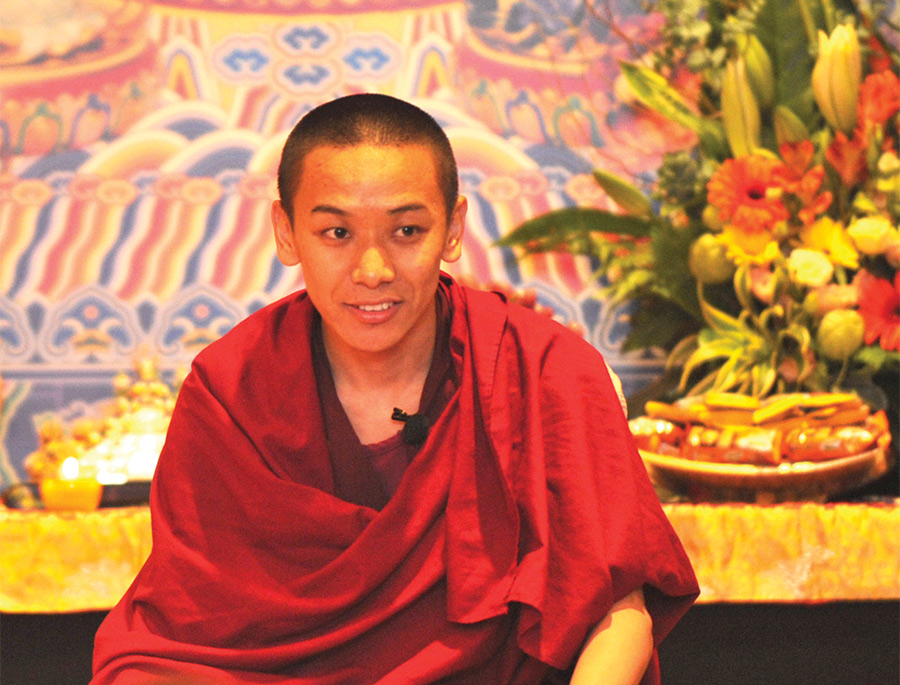
by Charok Lama Rinpoche
We have come a long way in our outer development in matters such as science and technology. The biggest leap in these developments happened not so long ago, within the last hundred years. One part of this happened because of the focus on happiness vs suffering, believing that making things easier, faster, better and more efficient will somehow make life happier for us; we have more time and more things to enjoy and also reducing our physical and mental suffering.
Modern technological advances have worked wonders in the fields of medicine, so health-wise, we have progressed a great deal. All this has had a huge effect on our mental well-being.
Yet somehow, development and achievements have messed up our basic human instincts to care, share and depend, leaving the universal idea of “US” to disappear slowly. The idea of “I” and “me” lifted by the ego has come to the fore; and with the development of technology and social media, the “I’” culture is being further boosted, making us care less and less about others, as many work on uplifting the self.
Indeed, we are lost in our own small world.
While struggles to make ourselves better inwardly have been around for thousands of years, Buddhist philosophy offers a profound method to work on oneself and our minds. The idea is to bring our minds into focus, to clear it of delusions, to focus on the real reasons that bring suffering. Buddhist teachings advise us on the reasons for suffering, and ways we can work on getting rid of suffering.
Buddhism works as a religion for those who follow it, and it works as a philosophy for those who contemplate on it.
One of the things in Buddhism I admire a lot, and therefore always mention, is that Buddhism is very flexible. It can be adapted to be useful in any kind of situation, and it provides us with a basic outline with which to work on ourselves. Buddhism works as a religion for those who follow it, and it works as a philosophy for those who contemplate on it. Seeing this, if not on the religion side, it is already leaving a huge impact on the logical and philosophical side of the world, especially on the study of the mind, giving scientists a huge field of study never put into work before.
It is hard to deal with the struggles of daily life, starting from family, work, friendship, trust, to dealing with issues and impacts of physical conditions, social media, loss of loved ones and so much more. And wouldn’t we all love to be able to deal with them and not have to face mental pressure, stress, guilt, hate and broken hearts.
It all comes down to the philosophical explanation of the Four Noble Truths, and contemplating on them does bring results, whether we want to ignore the possibility of us being free of those or to not acknowledge the possibility.
In the modern world, more and more of us are coming closer to acknowledging that there is the possibility, and therefore, in the near future, I believe that if not the religion side, the spiritual side will become a big part of many people’s lives.
Any tradition, no matter from where, disappears slowly; and like any tradition, the traditional side of Buddhism, whether Tibetan Mahayana Buddhism or Theravada, will eventually change into something more in line with the modern world. Coming to terms with this, I believe, can and will be a struggle for those who depend too much on the traditional side.
THOUGHTS ON THE TULKU SYSTEM
The Tulku system is a good example of this dilemma, although at the moment it is still regarded as a big thing when it comes to acknowledging “wise and learned lamas”. Yet we cannot deny that the system of recognizing and choosing tulkus has faults, and that it is even being misused in so many different ways. As His Holiness mentions, Tulku politics is a huge thing and people are coming to realize this.
With every Lobsang, Thupten and Tenzin being recognized as a tulku, we have no shortage of tulkus, and with a lot of tulkus leaving their name behind and choosing their own way in life, I guess the system must surely manifest faults.
It is sad because this tradition was one of the best ways for highly-realized beings to come back to the human realm to help devotees on the path of Dharma and to guide them. Unfortunately, I do believe it has gone beyond highly-realized beings to every well-known person being recognized, no matter their capability or practice.
It has even gone as far as China insisting they will choose the reincarnation of His Holiness. This is so alarming that His Holiness himself has decided to choose a successor even before he leaves us, in an attempt to avoid politics coming into the selection and recognition process.
It is sad because this tradition was one of the best ways for highly-realized beings to come back to the human realm to help devotees on the path of Dharma and to guide them. Unfortunately, I do believe it has gone beyond highly-realized beings to every well-known person being recognized, no matter their capability or practice.
Though the tulku system does need to stay alive because of the countless benefits that many will benefit if they can connect with a genuine reincarnation of an old lama, I believe the only way we can prevent it from going out of control is by not spoiling those kids and not putting too much expectations on small kids who are the so-called “recognized” ones.
We should wait for them to be taught and trained, allow them to grow up normally, and then observe and let them manifest their qualities. How we look at a child and regard him as a Buddha being and put His Holiness and His Eminence, Mahasidi etc in front of his name while they are still kids, and even before we are confident that they are the real reincarnation, is like becoming a disaster, not only for ourselves, but also for the kids recognized as well.
We have to know that no matter whose reincarnation it is to bring out the real results, they need to learn and train to be responsible and genuine, just like a seed needs to be nurtured to grow into a tree bearing fruits, people need tulkus who are willing to take on the role to benefit others and not themselves.
I would say there is no point in gold-leafing a pot full of dirt.
The devotees play a big role in what the tulku becomes, and so do the people around the tulkus. Those who have worldly ambitions will abuse the names of tulkus, therefore we have to be aware. We need to ensure that devotees do not pamper the recognized kid, and we need to avoid falling victim to the demands of those “surrounding” the tulkus as their guardian or attendant.
In short, the system has to change to adapt to the modern world. In Dharma, it is all about others; it is about the devotees, helping them and guiding them. If instead of helping, it is actually taking advantage of them, either by asking for big sums of money as donations or asking for other things, then it is a failed system. Whatever “offering” is given by devotees should be unsolicited and from the heart. When devotees are taken advantage of, then the system has failed the dharma, failed the devotees and failed oneself too. This is something that is true not just in reference to tulkus but also for all practitioners.
























